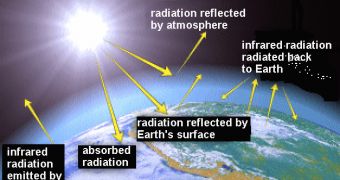Global warming has been in the scientists' attention for some time now. It was first discovered at the end of the 19th century, from studies that showed that the average temperature of the soil was rising. The greenhouse effect that is thought to trigger global warming takes its name from the Greenhouse, as a to compare the temperature from the interior of the greenhouse to that of the exterior.
The greenhouse effect works by the following principle: light coming from the Sun passes through the atmosphere and hits the ground; a part of that light, mainly the infrared radiation responsible for carrying heat, is absorbed by it, and the other part is being reflected back into space, if certain conditions are met. In an atmosphere such as ours, in this very day, due to greenhouse gases like carbon dioxide and methane, part of the reflected light from the Earth, cannot escape the atmosphere and is absorbed or is reflected back to the surface, heating it up in the process.
Carbon dioxide emissions started growing, as a result of industrialization, and the burning of large quantities of coal and petrol that eliminate large amounts of carbon dioxide. Fifty years ago, for a ton of carbon dioxide released into the atmosphere by man, half of that was being absorbed by the oceans and land. Now the percent of the carbon dioxide absorbed by natural "sinks" has dropped from fifty percent to forty-five percent. This means that the accumulation of greenhouse gases is rapidly accelerating.
Oceans are one major potential sink, absorbing carbon dioxide or changing it into other compounds containing carbon, and eliminating it from the atmosphere. The potential lack of mixing between the two ocean layers, the upper warmer one and the lower cooler layer, limits the carbon dioxide absorption only to the top layer, until it will get saturated and will not be able to take in any more gas.
The land like the ocean, can eliminate part of the carbon dioxide from the atmosphere, through photosynthesis, but drought produced by global warming reduces the plants growing process, meaning that they will absorb less carbon dioxide.
New experiments with integrated observations from the atmosphere, land and sea are needed to understand how the biosphere reacts to the changing clime. The only question the scientists have is if the warming will be accelerated.

 14 DAY TRIAL //
14 DAY TRIAL //